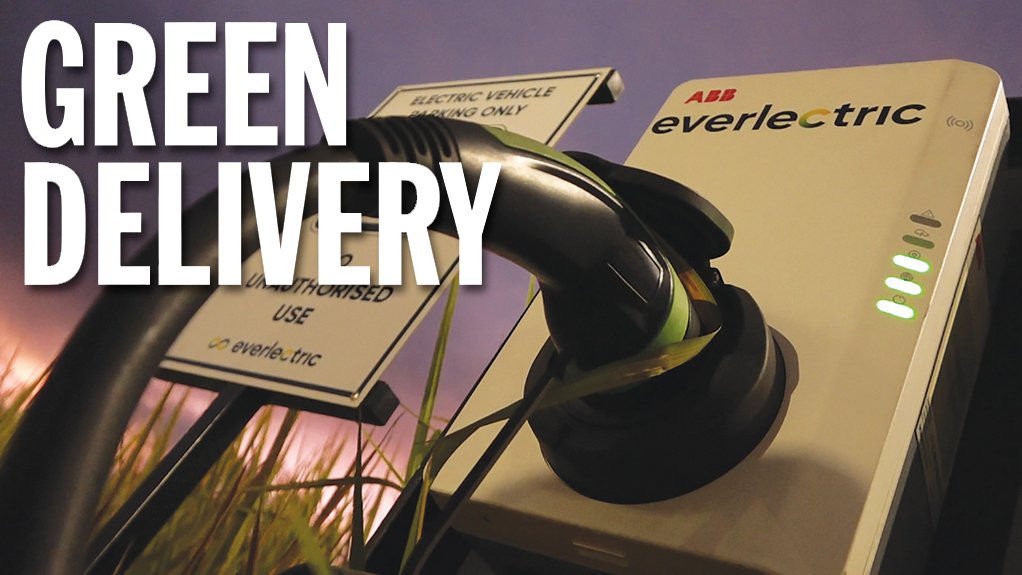Retailer’s last-mile deliveries to be made by solar-charged electric panel vans
Retailer Woolworths in June announced that it will start rolling out electric panel vans (EPVs) in partnership with logistics group DSV and mobility specialist Everlectric to deliver its customers’ online purchases in Gauteng, Cape Town and Durban.
This follows a ten-month trail period during which Woolworths put two Maxus EPVs from Chinese manufacturer SAIC through their paces for its last-mile deliveries.
The world’s largest electric vehicle (EV) battery producer is in China, while the Asian country also has the most EVs on its roads and produces the most EVs in the world by volume.
The move by Woolworths comes amid record fuel prices in South Africa.
Woolworths says the addition of the EPV fleet is in line with its ambition to decarbonise its footprint.
The retailer says the roll-out will result in up to 70% of its fleet being powered by electricity, which, according to the figures from the trial, will have the potential to save 700 000 kg of tailpipe carbon emissions a year.
“Last year we announced bold new sustainability goals and ambitions, which included the goal to have zero net carbon emissions by 2040, so we are very much looking forward to being the first retailer in South Africa to embark on such an extensive roll-out of EPVs to support our growing online business,” says Woolworths online and mobile head Liz Hillock.
“Over the last three years, we have invested over R1-billion in our digital capabilities, providing new and innovative experiences to meet the evolving needs of our customers, as well as to differentiate our services, which has resulted in an exponential growth of online sales.
“This latest investment in EPVs enables us to continue to grow our online business and deliver the Woolies difference, but with a lower carbon footprint.”
To power the vans, electricity will, as far as possible, be generated from renewable sources, including using solar installations at DSV’s fleet depots, as well as additional chargers at strategic Woolworths store locations, Hillock notes.
This means the retailer will not be dependent on energy supply from Eskom’s patchy, dirty coal-powered network.
“We will work closely with DSV and Everlectric to plan, position and negotiate the installation of these charging stations to leverage off existing renewable/solar installations co-located at the selected malls and retail locations,” says Hillock.
Should this not be possible, DSV and Everlectric will work with an audit firm to procure renewable-energy certificates to offset any indirect grid energy emissions.
Hillock adds that the EPVs tested offered both the necessary “consistency and range”, with one charge lasting for a full day of deliveries, at about 240 km.
The EPV used is a purpose-built EV with a load capacity of one ton. It has range of 300 km and a governed top speed of 120 km/h.
It has the ability to accept AC charging (eight hours), as well as DC fast-charging – the latter taking the EV from low battery to full in an hour.
The vehicle’s safety features include airbags, traction control and antilock braking.
The EPV has already been successfully homologated and licensed in South Africa.
“The vehicle can come in various configurations, including a panel van, a chassis-cab and an isolated refrigeration unit, running fully electric refrigeration units,” notes Hillock.
Woolies’ EPV fleet will replace up to 70% of its dedicated foods fleet, which comprises more than 75 vehicles, in the next six to 18 months.
Hillock says the retailer opted for EPVs over electric motorcycles, as the vehicles are scheduled to fulfil online home-delivery orders.
“Here we refer to customers who do bigger shopping, and to areas beyond our on-demand radius. Therefore, these orders are delivered by vans, not bikes.”
The on-demand radius is typically 5 km around a store.
Hillock notes that the exact timeframe of the EPV roll-out will depend on when Covid-19-related lockdowns are lifted in China, which should open up the required logistics chains to South Africa.
EVs-As-A-Service
Pretoria-based Everlectric believes that the South African logistics sector is ready to transition to a cleaner, more environment- friendly and sustainable future.
“We see the global renewable energy and EV trends as they are manifesting, and we know that it is only a matter of time before existing internal combustion engine (ICE) vehicles are replaced by EVs, due to their enhanced efficiencies and economic benefits,” says Everlectric CEO Ndia Magadagela.
The majority black-women-owned Everlectric was founded in 2019 by Magadagela, Paul Plummer and Wesley van der Walt – all executives from Blackslope Ventures, an investment group specialising in what it calls “transformative” startups.
Magadagela is a Deloitte-trained chartered accountant, and has experience in developmental deal making with the Industrial Development Corporation and the mergers and acquisitions division at the JSE-listed Momentum Metropolitan Holdings.
Blackslope has also invested in shoe and clothing manufacturer Freedom of Movement, based in Cape Town, thereby aiding in its countrywide expansion.
Everlectric’s contract with Woolworths should indeed be viewed as transformative in the automotive market, as this nontraditional automotive company is importing a product type not yet present in the country.
In fact, the EPV Everlectric will use in the Woolworths contract is not even available for sale through the company. It is currently only offered as a rental logistics solution to large fleet customers, should their specific business cases meet the operational, technical and financial metrics required for successful EV adoption, explains Van der Walt.
The company does, however, hope to also provide the vehicle to individuals in the next 12 to 18 months.
Van der Walt says Everlectric will then also provide the EPV fleet to DSV and Woolworths in a solution termed ‘EVs-as-a-Service’.
DSV will receive fully maintained and insured EVs, charging infrastructure and green electricity for an agreed-upon number of kilometres travelled over the rental period.
DSV will, in turn, use the Everlectric solution to operate a green logistics fleet dedicated to Woolworths, executing the retailer’s last-mile deliveries.
“As part of our service offering, we provide assurances on the availability of the vehicles, as well as the chargers for operational usage,” notes Van der Walt.
He says Everlectric believes that EVs can be sustainable and commercially attractive in local conditions, given the right technical, operation and financial circumstances.
He adds that the company’s business model is positioned at the intersection of three global megatrends, namely electric mobility, decarbonisation and assets-as-a-service offerings.
“Our business model overcomes the conventional challenges of EV adoption, and makes the transition to EVs easy, accessible, convenient and affordable.”
DSV GM Candice Liebenberg says her company will replace 77 (75 new vehicles plus the two test vehicles) of its ICE vehicles that currently handle Woolworths food deliveries with the Everlectric EPV fleet.
“Among other features, the vehicles will be powered by solar-powered charging stations at DSV’s facilities and strategically located retail outlets where Woolworths is a tenant.”
Local Content
Everlectric’s goal is to incorporate locally manufactured or assembled components into the value chain as far as possible, says Magadagela.
However, EV-specific localisation options are currently “very limited”, as South Africa is viewed as an uncompetitive market for EVs and associated industries, compared with many other global markets.
“But we have managed to source our vehicle-extras locally,” says Magadagela. “These include vehicle wrapping, bull bars, upholstery, safety equipment and camera and telematics systems.
“We’ll also purchase locally available vehicle consumables like vehicle brakes, tyres and so forth.”
Everlectric also intends to advance local job creation through the training of specialised technical and professional skills required for these new-energy vehicles, notes Magadagela.
“These skills are more akin to the Fourth Industrial Revolution and require a certain degree of upskilling in the existing vehicle technician industry.”
Everlectric is also actively assessing local charging infrastructure solutions and hopes to test these in its operations, adds Magadagela.
“We will also partner with battery recycling initiatives when they are active in South Africa. In the interim, Everlectric has partnered with the uYilo eMobility Programme to maximise local collaboration in the EV industry.”
uYilo is a government-funded programme to enable, facilitate and mobilise e-mobility in South Africa.
Magadagela notes that Everlectric’s goal is to ultimately stimulate EV demand in South Africa, thereby accelerating opportunities for local original-equipment manufacturers (OEMs, or vehicle manufacturers) to produce EVs.
“Everlectric will purchase locally manufactured or sourced EVs as soon as they are available. We are excited and open to working with partners who have local solutions in this space.”
She warns, however, that factors such as the ad valorem tax levied on EV imports will make it difficult to establish a competitive EV market in South Africa.
South Africa has a 25% import duty on EVs – higher than the import duty levied on an ICE vehicle.
There is also an additional ad valorem, or luxury tax, imposed on EVs, as they were historically seen as luxury goods.
The ad valorem tax is limited to an additional 30% based on the sliding threshold of the underlying value of the vehicle.
The higher the cost price of the vehicle, the closer the ad valorem tax is to the full 30% and vice versa, explains Magadagela.
Local OEMs are also stuck in limbo on the benefits – if any – of domestic manufacture and export, as government is still to finalise its EV strategy.
Globally, countries have dropped their taxes on EVs in order to stimulate demand for the zero-emission technology.
Article Enquiry
Email Article
Save Article
Feedback
To advertise email advertising@creamermedia.co.za or click here
Comments
Announcements
What's On
Subscribe to improve your user experience...
Option 1 (equivalent of R125 a month):
Receive a weekly copy of Creamer Media's Engineering News & Mining Weekly magazine
(print copy for those in South Africa and e-magazine for those outside of South Africa)
Receive daily email newsletters
Access to full search results
Access archive of magazine back copies
Access to Projects in Progress
Access to ONE Research Report of your choice in PDF format
Option 2 (equivalent of R375 a month):
All benefits from Option 1
PLUS
Access to Creamer Media's Research Channel Africa for ALL Research Reports, in PDF format, on various industrial and mining sectors
including Electricity; Water; Energy Transition; Hydrogen; Roads, Rail and Ports; Coal; Gold; Platinum; Battery Metals; etc.
Already a subscriber?
Forgotten your password?
Receive weekly copy of Creamer Media's Engineering News & Mining Weekly magazine (print copy for those in South Africa and e-magazine for those outside of South Africa)
➕
Recieve daily email newsletters
➕
Access to full search results
➕
Access archive of magazine back copies
➕
Access to Projects in Progress
➕
Access to ONE Research Report of your choice in PDF format
RESEARCH CHANNEL AFRICA
R4500 (equivalent of R375 a month)
SUBSCRIBEAll benefits from Option 1
➕
Access to Creamer Media's Research Channel Africa for ALL Research Reports on various industrial and mining sectors, in PDF format, including on:
Electricity
➕
Water
➕
Energy Transition
➕
Hydrogen
➕
Roads, Rail and Ports
➕
Coal
➕
Gold
➕
Platinum
➕
Battery Metals
➕
etc.
Receive all benefits from Option 1 or Option 2 delivered to numerous people at your company
➕
Multiple User names and Passwords for simultaneous log-ins
➕
Intranet integration access to all in your organisation




















